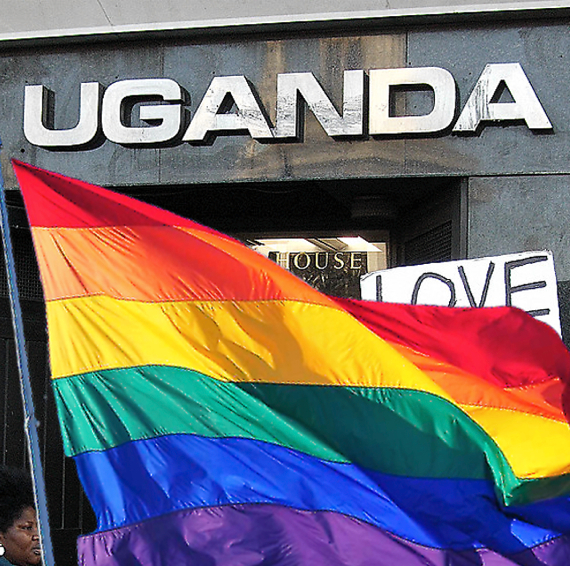
The gay rights struggle in Uganda has captured the world's attention since the anti-homosexuality bill was first introduced in late 2009. At the same time similar struggles in other countries seem to come and go without making headlines. Last week Gambia moved toward adopting a 'Uganda-style' law imposing a life-sentence for "aggravated homosexuality." Lawmakers in Nigeria, Liberia, Burundi, Democratic Republic of Congo, and Kenya have sought the same over the past few years. Why has there been such a marked difference between the hyper-velocity of news about Uganda compared to the muted awareness of LGBT rights in other countries?
Attention to Uganda was the result of three factors that combined in a way that has not happened since. First, LGBT advocates in Uganda sought international attention at the very beginning of the legislative process. Though the Anti-Homosexuality Bill was officially introduced in 2009, government officials began talking about strengthening the law against homosexuals a year earlier, citing both morality and the HIV/AIDS epidemic as justifications.
That summer, in July 2008, Uganda hosted a global conference of 1,700 leaders from governments, the United Nations, and private organizations to discuss implementation of the global strategies to combat HIV/AIDS. Three Ugandan activists entered the Serena Hotel, the site of the conference, to put flyers directly into the hands of foreign visitors, informing them about the hostilities building against LGBT Ugandans. The Ugandan government was indeed aggravated. The three were arrested and news began slowly to spread.
The LGBT community in Uganda continued to engage directly with UN and foreign government officials, and even issue instructions to the global community about what actions to take. In some countries, activists have made the strategic decision to avoid international entanglement and keep the discussions about anti-gay legislation home grown. In others, advocates have sought international attention and did not receive it.
The second factor at play in Uganda, and possibly the more important element of international scrutiny, was that the President himself has sought international attention. Having ruled for two decades, President Museveni is a sophisticated politician who has made his personal leadership of Uganda an international issue. In 2007, Museveni became the chair of the Commonwealth of Nations, made up of the fifty-some countries that were mostly territories of the former British Empire. The meeting of the Commonwealth heads of government in Kampala became a platform for Museveni to showcase his accomplishments to the world.
In early October 2009, the text of the anti-Homosexuality bill was made public and the first dramatic confrontation would happen on the global stage. At that time Museveni was set to travel to Trinidad, the site of that year's Commonwealth heads of government meeting, to preside as Chair over discussions about trade, climate and governance. Outrage over Museveni's role in the Commonwealth began to grow. Just before the meeting, Steven Lewis, former UN Envoy on HIV/AIDS in Africa, gave a blistering speech in Trinidad, calling the bill "menacing" and "lunatic" and saying that Museveni was threatening the legitimacy of the Commonwealth by chairing the meeting.
Museveni did not want to give up global leadership. He only had two remaining choices as chair of the meeting: Either defend the bill and risk having the meeting's agenda hijacked by issues of LGBT human rights, or stay silent and let the criticism run its course at the meeting. He chose the latter. Museveni would later be quoted as saying that all he heard from foreign leaders was about "Gays" and that it had become an issue of his foreign policy.
Lastly, the transnational profile of LGBT rights was accelerating at the same time the bill in Uganda was moving slowly through the Parliament. By this, I mean that LGBT rights were increasingly part of foreign policy decisions and international discussion. Governments, particularly donor governments, were experimenting with how far to push LGBT issues. In the mid-2000s the United Nations were beginning to seriously include LGBT rights in human rights decisions. The European Union was rolling through LGBT-supportive directives and accessions, and several major international NGOs were launching LGBT programs.
Headlines again focused on Uganda when some countries seem to dangle aid cut-offs as a response to anti-gay legislation. LGBT social justice activists tempered these discussion when they questioned whether LGBT human rights should be considered a prerequisite for foreign aid. The lasting effect of these discussions on international actors has been to restrain aggressive, media-grabbing rhetoric of aid withdrawals with regard to anti-gay legislation in other countries
The status of the Uganda law is yet clear. Even if the Courts strike it down on technical grounds, Parliament may try to pass a new version. Whatever its course, it is likely that we will be reading about it in the headlines.
Advertisement